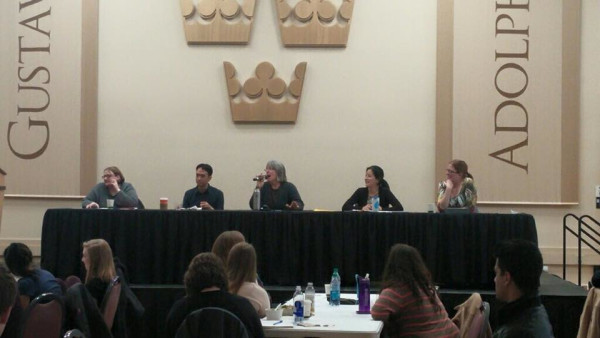In an effort to make improvements and combat racism moving forward, the “Ferguson and Beyond” teach-in took place on January 26, and included a panel of professors that discussed different ways to analyze the incidents in Ferguson, Missouri.
Religion, LALACS, Peace Studies, and Gender, Women and Sexuality Studies Professor Thia Cooper was instrumental in planning the teach-in. Conversations she had with students provoked her to organize the teach-in as a place for students to discuss and process modern racism, what had happened, and what to do about it.
Cooper explained the “beyond” part of the event, which is to examine racism in the United States outside of one Missouri area.
“The beyond part of “Ferguson and Beyond” extends to two things: first, the killing of Mike Brown is not an isolated incident. This is something that, unfortunately, occurs regularly in our society. The second is how can we move beyond this and change the situation?” Cooper said.
The day began with former Chaplain of the Minnesota Timberwolves, Thomas Van Leer, speaking during Daily Sabbath. After this, the teach-in moved to Alumni Hall where two sets of panelists addressed the topic of Ferguson and racial tensions in the United States.
“The starting point of making change is really easy: talk about it.”—Thia Cooper
The teach-in first addressed the question, “how did we get here?” where four professors discussed the racial climate of Ferguson and the conditions that caused a relatively common event to receive the response it did. Geography Professor Joaquin Villanueva, Economics and Management and Gender, Women and Sexuality Studies Professor Kristian Braekken, Associate Provost and Dean of Arts and Humanities Paula O’Loughlin, and Gender, Women and Sexuality Studies and Political Science Professor Alisa Rosenthal gave different perspectives to address this question.
The second group of panelists spoke to the question, “where do we go from here?” Having discussed the issues revolving around race, the next step was to talk about the actions that students and the Gustavus community could take to combat racism.
Cooper, Classics and Gender, Women and Sexuality Studies Professor Yurie Hong, Education Professor Lisa Dembouski, and History Professor Sam Vong took on the challenge to propose ways to address this difficult issue, looking beyond Ferguson and into Gustavus’ own community and in the entirety of the United States.
Vong spoke about the “Tactics of Insurgency: Riots Uprisings, and Organizing.” He emphasized the fact that the incident in Ferguson extends well before this summer. The United States’ past proves a history of violence toward minorities.
“The notion that Ferguson is a wake-up call ignores the history of racial violence, sometimes sanctioned by the state. The events of Ferguson are a painful reminder of the persistence of racial inequality and the racial terror that many black and brown people are subjected to,” Vong said.
Vong went on to discuss the riots of Ferguson, saying that although riots can be destructive, they can contribute to a movement toward change.
“Civil disobedience comes in many forms. Riots, in the case of Ferguson, are a political means and they help disrupt routine forms of violence and subordination. More importantly, because of the highly visible forms of resistance of rioting, they help to activate other forms of organization,” Vong said.
Junior Ally Hosman attended the teach-in. She was able to connect with other students to discuss this issue and commit to make a change. The idea of whites making a pact to be allies with minorities particularly interested Hosman.
“We learned how to be allies in a much more broad context because I always thought that allyship was for the LGBTQ community and it was really wonderful to learn about this concept in different parts of my life and how they intersect,” Hosman said.
Hong discussed the use and misuse of social media to promote change. Hosman agreed with Hong, saying social change takes more than the occasional tweet or status update.
“In today’s society, a lot of our activism has been posting on Facebook or Twitter, and I think that’s great — it’s the educational portion. But there also comes a time when you need to shut that computer and get out in the world and do something,” Hosman said.
Hosman says real change does not happen through angry Facebook comment wars or posting an article for others to read.
“That can be valuable, but it can’t be the only thing that you can do. Sometimes social media isn’t the place to have those conversations. You can’t really have an impact on someone in the same way that you can when you are sitting and conversing with them,” Hosman said.
Cooper agreed that social change is possible, but it takes commitment to change. Each person has their own skills and passions to improve an issue that he or she cares about. She advised that starting this change is easier than one might think.
“The starting point of making change is really easy: talk about it. Then you can think about what is the one particular issue that you are really passionate about and start organizing for change,” Cooper said.
For more information on the “Ferguson and Beyond” teach-in and how one can get involved, contact Cooper.
-Laura Isdahl
